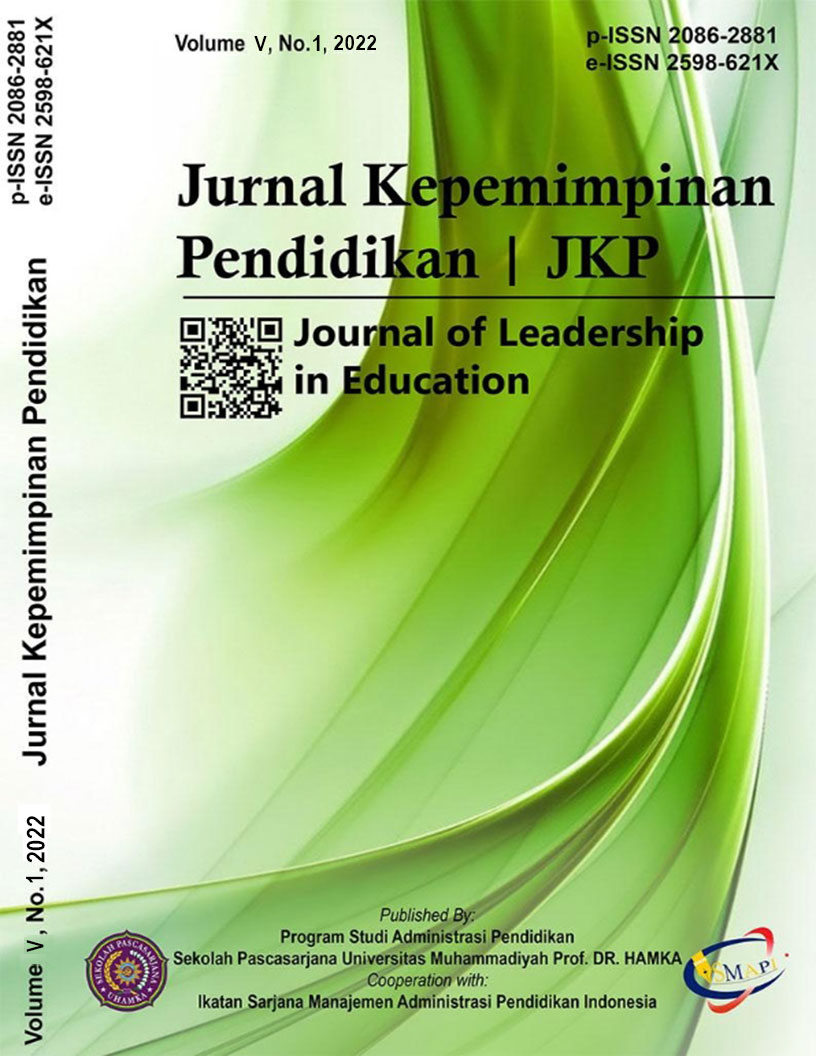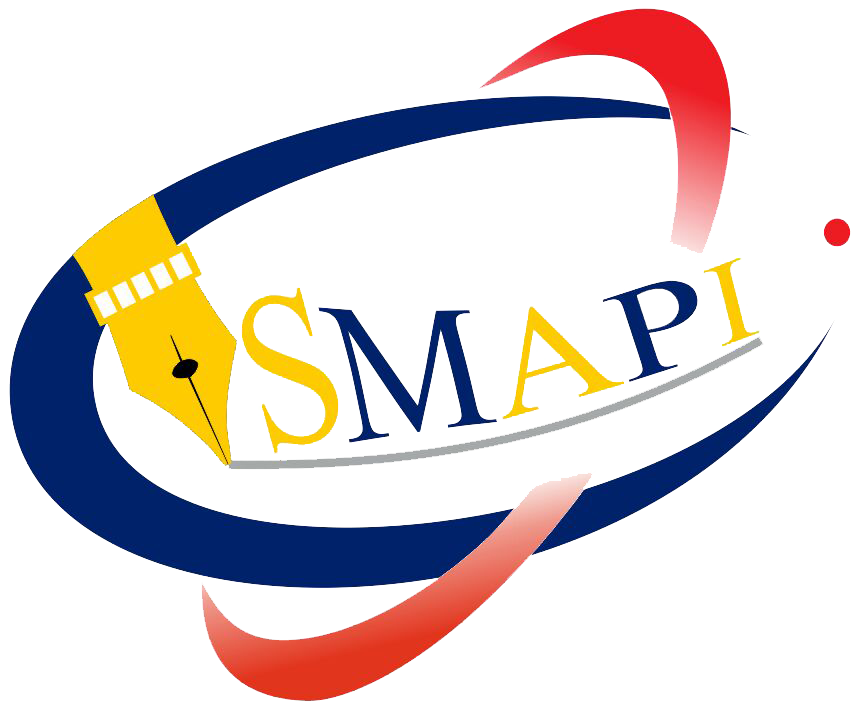THE EFFECT OF QUALITY OF ACADEMIC SERVICES AND INFRASTRUCTURE ON STUDENT SATISFACTION AT UHAMKA POSTGRADUATE SCHOOL
DOI:
https://doi.org/10.22236/jkpuhamka.v5i1.9233Keywords:
QUALITY, Academic Service, Infrastructure, student satisfactionAbstract
This study aims to examine: 1) the direct effect of academic service quality on student satisfaction, 2) the direct influence of infrastructure on student satisfaction, and 3) the direct influence of academic service quality on infrastructure. This study uses quantitative research methods. The target population was 318 students and the sample of research was 178 respondents. Data collection techniques are interviews and questionnaires. The research data analysis technique used path analysis. Research results prove that: first, the quality of academic services has a direct positive effect on student satisfaction. The value of the coefficient of determination is 0.527, which means that 52.7% of student satisfaction can be explained by the quality of academic services. Second, infrastructure has a direct positive effect on student satisfaction. The coefficient of determination is 0.345, which means that 34.5% of student satisfaction can be explained by infrastructure. Third, the quality of academic service has a direct positive effect on Infrastructure. The coefficient of determination is 0.137, which means that 13.7% of infrastructure can be explained by the quality of academic services.
Downloads
References
Ali, F., Zhou, Y., Hussain, K., Nair, P. K., & Ragavan, N. A. (2016). Does higher education service quality effect student satisfaction, image and loyalty? A study of international students in Malaysian public universities. Quality assurance in education.
Ali, M., & Raza, S. A. (2017). Service quality perception and customer satisfaction in Islamic banks of Pakistan: the modified SERVQUAL model. Total Quality Management & Business Excellence, 28(5-6), 559-577.
Annamdevula, S., & Bellamkonda, R. S. (2012). Development of HiEdQUAL for measuring ServiceQuality in Indian higher education sector. International journal of innovation, management and Technology, 3(4), 412.
Aqfir, & Bustam. (2020). Pengaruh Sarana Prasarana Pendidikan, Proses Pembelajaran dan Kkompetensi Dosen Terhadap Kepuasan Mahasiswa Pada Sekolah Tinggi Ekonomi (STIE) Mujahidin Tolitoli. Jagoe: Journal Actual Organization Of Economi, 1(1), 44–55
Arukutty, T. (2018). A study on the medical service quality and its influence upon level of patient's satisfaction with special reference to selected Major Multispeciality Hospitals, Chennai City. TRANS Asian Journal of Marketing & Management Research (TAJMMR), 7(12), 22-34.
Bararah, I. (2020). Pengelolaan Sarana dan Prasarana Pendidikan Dalam meningkatkan Kualitas Pembelajaran. Jurnal Mudarrisuna, 10(2), 351–370. https://doi.org/: http://dx.doi.org/ 10.22373/jm.v10i2.7842
Boko, Y. A. (2020). Perencanaan Sarana dan Prasarana (Sarpras) Sekolah. Jurnal Pendidikan Dan Ekonomi, 1(1), 44–52. https://doi.org/https://doi.org/10.5281/zenodo.4435225
Borishade, T. T., Ogunnaike, O. O., Salau, O., Motilewa, B. D., & Dirisu, J. I. (2021). Assessing the relationship among service quality, student satisfaction and loyalty: the NIGERIAN higher education experience. Heliyon, 7(7), e07590.
Conefrey, T., 2018. Supporting first-generation students' adjustment to college with high- impact practices. J. Coll. Stud. Retent.: Res. Theory Pract. 1–22.
De Jager, J., Gbadamosi, G., 2013. Predicting students' satisfaction through service quality in higher education. Int. J. Manag. Educ. 11 (3), 107–118.
Dollinger, M., Lodge, J., & Coates, H. (2018). Co-creation in higher education: Towards a conceptual model. Journal of Marketing for Higher Education, 28(2), 210-231.
Gruber, T., FuíŸ, S., Voss, R., & Gläser"Zikuda, M. (2010). Examining student satisfaction with higher education services: Using a new measurement tool. International journal of public sector management.
Hanafi, R., & Mansur, M. (2020). Pengaruh Kualitas Pelayanan Dosen Dan Fasilitas Perkuliahan Terhadap Kepuasan Mahasiswa Fakultas Ekonomi Dan Bisnis Universitas Islam Malang. Jurnal Ilmiah Riset Manajemen, 09(06), 64–73. Retrieved from http://www.riset.unisma.ac.id/ index.php/jrm/article/view/6225
Harahap, Y., & Zulkarnain, M. M. Z. (2019). Pengaruh Kualitas Pelayanan Akademik Dan Sarana Prasarana Pendidikan Terhadap Kepuasan Mahasiswa Fakultas Keguruan Dan Ilmu Pendidikan (FKIP) Universitas Riau. Jurnal Manajemen Pendidikan, 7(1), 116–128. Retrieved from https://jmp.ejournal.unri.ac.id/index.php/JMP/index
Ibidunni, A.S., Mozie, D., Ayeni, A.W.A.A., 2021. Entrepreneurial characteristics amongst university students: insights for understanding entrepreneurial intentions amongst youths in a developing economy. Educ í¾ Train 63 (1), 71–84.
Kalkan, íœ., Altınay Aksal, F., Altınay Gazi, Z., Atasoy, R., & DaÄŸlı, G. (2020). The relationship between school administrators' leadership styles, school culture, and organizational image. Sage Open, 10(1), 2158244020902081.
Khuluqo, I. El, Abdullah, T., & Hidayat, E. (2020). Kepemimpinan Pendidikan. Kabupaten tuban: CV. Karya Litera Indonesia.
Lemon, K. N., & Verhoef, P. C. (2016). Understanding customer experience throughout the customer journey. Journal of marketing, 80(6), 69-96.
Lu, V. N., Wirtz, J., Kunz, W. H., Paluch, S., Gruber, T., Martins, A., & Patterson, P. G. (2020). Service robots, customers and service employees: what can we learn from the academic literature and where are the gaps?. Journal of Service Theory and Practice, 30(3), 361-391.
Mustaffa, W. S. W., Ali, M. H., Bing, K. W., & Rahman, R. A. (2016). Investigating the relationship among service quality, emotional satisfaction and favorable behavioral intentions in higher education service experience. Procedia-Social and Behavioral Sciences, 224, 499-507.
Ogunnaike, O.O., Ayeni, B., Olorunyomi, B., Olokundun, M., Ayoade, O., Borishade, T.T., 2018. Data set on interactive service quality in higher education marketing. Data in Brief 19, 1403–1409.
Ogunnaike, O.O., Borishade, T.T., Sholarin, A.A., Odubela, O.O., 2014. Empirical analysis of marketing mix strategy and student loyalty in education marketing. Mediterr. J. Soc. Sci. 5 (23), 616–625.
Olokundun, M.A., Ogbari, M.E., Obi, J.N., Ufua, D.E., 2019. Business incubation and student idea validation: a focus on Nigerian Universities. J. Enterpren. Educ. 22 (1).
Parid, M., & Alif, A. L. S. (2020). Pengelolaan Sarana dan Prasarana Pendidikan. Tafhim Al-Ilmi: Jurnal Pendidikan Dan Pemikiran Islam, 11(2), 266–275. https://doi.org/https://doi.org/ 10.37459/tafhim.v11i2.3755
Quintal, Phau, 2016. Comparing student loyalty behavioural intentions across multi entry mode deliveries: an Australian perspective. Australas. Market J. 24, 187–197.
Rauschnabel, P. A., Krey, N., Babin, B. J., & Ivens, B. S. (2016). Brand management in higher education: the university brand personality scale. Journal of Business Research, 69(8), 3077-3086.
Rita, P., Oliveira, T., & Farisa, A. (2019). The impact of e-service quality and customer satisfaction on customer behavior in online shopping. Heliyon, 5(10), e02690.
Rutter, R., Roper, S., & Lettice, F. (2016). Social media interaction, the university brand and recruitment performance. Journal of Business Research, 69(8), 3096-3104.
Sultan, P., Wong, H., 2010. Performance-based service quality model: an empirical study on Japanese Universities. Qual. Assur. Educ. 18 (2), 126–143.
Sumarni, Y. (2018). Pengaruh Kualitas Pelayanan Administrasi Akademik dan Kemahasiswaan Terhadap Kepuasan Mahasiswa Fakultas Ekonomi dan Bisnis Islam IAIN Bengkulu. Baabu Al -Ilmi, 3(1), 71–91. https://doi.org/http://dx.doi.org/10.29300/ba.v3i1.1474
Sumianti, Syamsuddin, Nurhalimah, S., Hasbullah, Herlina, & Musjuliana. (2020). Analisis Tingkat Kepuasan Mahasiswa terhadap Layanan Administrasi Akademik Pegawai IAIN Kendari. Jurnal Ta'dib, 23(1), 29–38. https://doi.org/http://dx.doi.org/10.31958/jt.v23i1.1821
Supranto. (2017). Pengukuran tingkat kepuasan pelanggan. Jakarta: Rineka Cipta.
Susanti, N. (2020). Pengaruh Kualitas Pelayanan dan Fasilitas Terhadap Kepuasan Belajar Siswa SMK YADIKA 5 Pondok Aren. Jurnal Ilmiah Feasible, 2(2), 217–228. https://doi.org/https:// doi.org/http://dx.doi.org/10.32493/fb.v2i2.2020.217228.6557
Tight, M. (2020). Student retention and engagement in higher education. Journal of further and Higher Education, 44(5), 689-704.
Tjiptono, F., & Chandra, G. (2016). Service, Quality & Satisfaction (4th ed.). Yogyakarta: CV Andi Offset.
Trijono, R. (2015). Metodologi Penelitian Kuantitatif. Jakarta: Papas Sinar Sinanti.
Worlu, R., Kehinde, O.J., Borishade, T.T., 2016. Effective customer experience management in health-care sector of Nigeria: a conceptual model. Int. J. Pharmaceut. Healthc. Market. 10 (4), 449–466.















